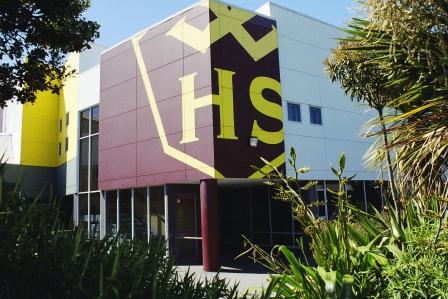Senior year is a year of last opportunities. The last first day, the last exam, and most importantly, the last chance to get involved in things around the school. Whatever you are up to, it’s your last chance. And with that last chance in mind, the Year 13s of WHS are jumping at the chance and joining in with the school to do outstanding things with people who share their interests. For them, it’s a year of grasping last opportunities before the final year ends. They’re juggling work and play to further their horizons and meet new people. They are continuing the legacy of clubs and leaving a mark in the Wellington High history books. For Seniors, participating can mean a lot more than just being in the group, it can mean leading it.
At Wellington High School, many senior positions in the different sports teams and groups are held by Year 13s. It is, for example, a tradition to hand the reins of Shakespeare to a pair of Year 13s, and student representatives are commonly in their last year of High. Good leaders of cocurricular activities are responsible and dedicated to their groups. For those Seniors involved in leading groups like Debating and Shakespeare productions, they have a major role in the student decision making too.
Kasey Leary, representative for Sport on the Student Council, finds that her job is a big responsibility. She has ‘to go to the meetings, and discuss issues from the sporting community.’ These meetings are regular, and despite being a representative, her responsibilities are not well recognised. ‘it’s kind of hard to get the issues you’re talking about [worked out]: a lot of people don’t recognise you as having the role that [you’re] in.’ Her responsibilities are necessary, but don’t hold much leverage.
For Jack Comer Hudson, leader of the Debating Society and the Model UN, it’s ‘coordinating teams and assigning coaches and adjudicators. For Wellington High School Model UN, I advocate on behalf of the UN to the school.’ It takes up a lot of his time, with coordinating debating a task that cuts into his spare time.
Shakespeare Society directors Caitlin Fitt Simpson and Richard Christy Jones held the responsibility of ‘directing a Shakespeare play.’ In this role, they overlooked all the workings behind the scenes. ‘It’s just an interesting process to be able to edit the script and see all these people perform. We have control over how it all looks’. Both have been involved in Shakespeare before, and have been acting for a long time. ‘I have been acting in a play this year’, Richard discussed. ‘Theatre is really important to me.’
For each of these groups, the leaders have a lot of responsibility to undertake. They do not have much teacher involvement other than as an advisor, and are required to take matters into their own hands. Unfortunately, outside of groups, they do not have the recognition in bodies like the Student Council. However, leaders do have a lot of presence as role models in the community.
‘When people know me, I get surprised,’ Kasey says, ‘I’m kind of known for playing sports… I enjoy playing sports, always have, always will.’ Jack ‘advocates for the school to the Model UN. I guess you could call me a role model.’
Seniors in any leadership position are the role models of Wellington High School because of the involvement they participate in throughout the school. Leaders in cocurricular activities are representatives for success inside the school and out, with sports and cultural leaders representing Wellington High School at tournaments and conferences. Shakespeare in particular attracts parents for students and possible students alike. With students in the leadership, they are representing the school.
Student leaders also get the benefits of having extra experience on their CV for job opportunities outside of school. Kasey, as a coach for Volleyball, found that the involvement in running and participating in her sports made her stand out from other candidates in a job application. Leaders of Shakespeare have found that involvement has been great to show experience both on the stage and behind it. ‘It’s just a good opportunity to advance our acting and theatre skills, and to have more control and more insight into how productions happen’.
But when leaders get overwhelmed, it can mark disaster for their group.
Year 13 Dean, Megan Southwell, stresses that being a leader is not easy, and can have quite negative effects. ‘Shakespeare has broken a couple of people in the past. I think there’s been the occasional year where there’s only been one or two people step up for all of the positions, and that gets really challenging for them.’ Although this term hasn’t been very intense, some are worried about how increased workload will affect their leadership. Caitlin of Shakespeare thinks that ‘later this term, and definitely towards next term when the date of the play is coming up we will be really juggling and stressing out.’ It’s a tough job, and nobody says it’s easy.
Ms Southwell has found that ‘students who perhaps hide the fact that they’re struggling until the last minute [find leading extremely hard].’ For those students who don’t know when to ask for help, the group’s events can be ruined and the leaders can become very stressed and anxious.
Even with a successful group, leaders give up a lot of free time for the success of their activities. ‘I haven’t had a weekend off this year’ says Richard Christy Jones, ‘You realise how stressed directors must get. Directing can be full on.’ Jack Comer Hudson has ‘No time between leading… There is a lot of stuff I need to get done.’ Being a leader can mean sacrifices to their free time, and if the leaders don’t juggle their responsibilities effectively, it can mean disaster for their groups.
No matter what the difficulties, student leaders are up for the challenge. Every leader understands the load and is ready to work around it. Megan Southwell says ‘The academic achievement still tends to maintain itself as being up quite high for students who are involved in lots of sports or other activities.’ This is mainly because those who get into leadership roles are ready to take on the challenge. Even though their workload is increased, leaders work around it: sacrificing their spare time for the success of their group.
Whether it be dividing responsibilities like in the debating society or planning rigorously like the Shakespeare Society, the Year 13s leading the way are prepared to keep on top of things. ‘last year’s group managed that incredibly well, and it looks like this years will as well… this group of year 13s are amazing: there’s so many people stepping up for leadership roles.’
If you are a Year 9 or a newly appointed Student Leader of Wellington High School, it can be safely said that getting involved is worth it. Doing something new in school has its ups and downs, but is worth it. The call to arms won’t last forever. For year 13s, it’s their last chance to do so. By participating they expand their horizons after school finishes and leave their mark in the hallowed halls of Wellington High. ‘It’s about living your school life to the fullest’, says Wellington High Jazz Band drummer Sarah Asher, ‘you’re only at High School once’.
Kasey McDonnell


